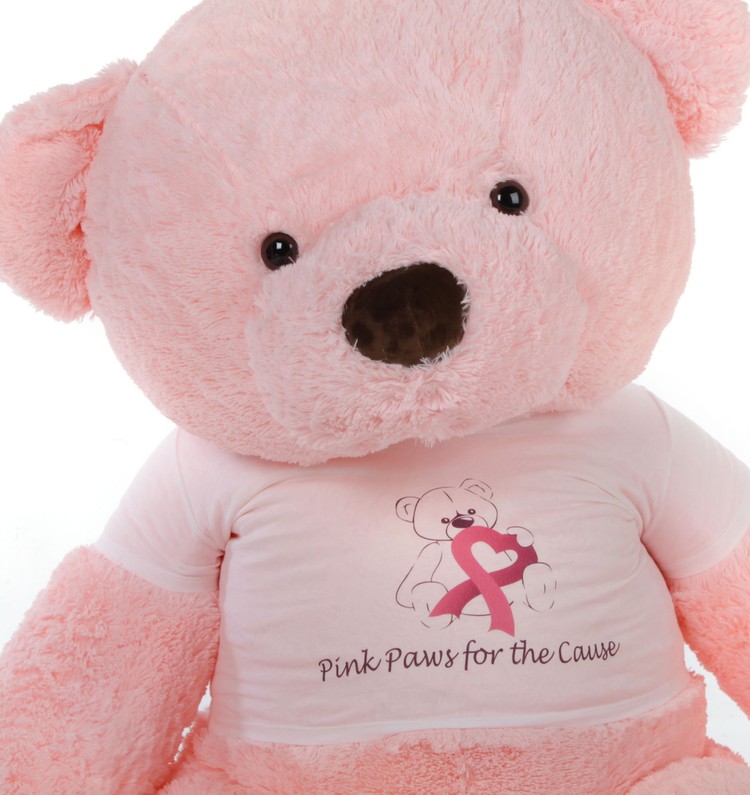The pink teddy bears were what really got her. Here she was, a 59-year-old woman with breast cancer, and a stuffed animal was supposed to make her feel better.
No thank you. “That did not go down well with me. It seemed like an insult to my dignity,” says Barbara Ehrenreich, author of Bright-Sided: How Positive Thinking Is Undermining America (2009). She was diagnosed with breast cancer in 2000.
So maybe she didn’t want a teddy bear. But the intent is fair, right? Cheer up, because we all know positive thinking and a fighting spirit will help cure this thing.
Actually, no, we don’t know, Ehrenreich says. And scientists are backing her up.
Guilted into Laughter
The cancer world is steeped in messages to think positively and employ your fighting spirit. “FIGHT like a girl!” reads a bright pink T-shirt from Susan G. Komen for the Cure, a breast cancer nonprofit. “Never Give In,” implore dog tags from the Prostate Cancer Foundation.
A company called MedTees sells humorous shirts for all sorts of problems. Burn victims can declare, “I used to be a tour guide for Chernobyl.” Think dementia has no upside? Not so. Another shirt reads, “The nice thing about being SENILE…you can hide your own Easter eggs.”
Laugh or fight. They may seem different, but the ideas are similar, Ehrenreich says. The message is that changing your mind will change your outcome.
It’s possible that optimism strengthens the immune system. But explanations are elusive.
There’s nothing wrong with laughing or taking a fighting stance—if that’s your natural way of coping. The problem, scientists say, is that the message is taken too far. Positive thoughts alone are no cure. And not everyone can manifest them.
“If you just aren’t that kind of a person or you can’t summon up that upbeat attitude when you’re in the throes of retching from chemotherapy, you’re set up for feeling terribly guilty,” says Richard P. Sloan, PhD, a professor of behavioral medicine at Columbia University Medical Center and author of Blind Faith: The Unholy Alliance of Religion and Medicine (2006).
What the Science Shows
Though scientists generally believe your thoughts alone won’t cure you, some studies have found that optimism could lead to a healthier immune system, make wounds heal faster and lower your risk of heart disease and stroke, among other things. But the reasons remain somewhat elusive.
In February 2010, the scientific journal Annals of Behavioral Medicine devoted 47 pages to a debate about positive thinking and health. Arguing for the benefits, researchers Lisa G. Aspinwall, PhD, and Richard G. Tedeschi, PhD, wrote that optimistic people are more likely to take better care of themselves—exercise, eat healthfully and not smoke. They also may adhere better to medical instructions and rehabilitation. So the actions, not the thoughts, are what account for at least some of the good health outcomes.
“Positive feelings are signs of health; they do not cause good health,” says Howard S. Friedman, PhD, coauthor of The Longevity Project: Surprising Discoveries for Health and Long Life from the Landmark Eight-Decade Study (2011). “Thinking positive thoughts will not cause your cancer cells to decide to self-destruct, but it might help you get up and out of bed, eat your spinach, complete your chemotherapy, improve your digestion and get a good night’s sleep.”
It’s possible that optimism strengthens the immune system. But for cancer in particular, the evidence is “quite limited and unconvincing,” wrote researchers James C. Coyne, PhD, and Howard Tannin, PhD, in their skeptics’ argument for the Annals debate.
Plus, then you have to prove that it matters. “In some instances, tumors may even enlist the immune system to accelerate development,” they wrote. So strengthening it may not always be a benefit.
“Even if you were to accept that the connection between optimism and better health is plausible, and that’s a hypothetical, we don’t have any evidence that people changing—becoming more optimistic or more positive—reduces their risk of disease,” Sloan says. “For example, some third factor, perhaps a genetic factor, could cause both.”
When Belief Means Hope
The idea of changing your mind to change your health has been around in America since the mid-1800s, Sloan wrote in a 2011 New York Times op-ed. In 1952, Norman Vincent Peale popularized it again in his bestseller, The Power of Positive Thinking. Today, we have Rhonda Byrne’s runaway hit, The Secret (2006), with its “ask, believe, receive” philosophy.
Despite the popularity of messages that you can cure yourself through thoughts, researchers generally contend that the science doesn’t back them up. Yet many people continue to believe—and they say they have seen it work.
Patricia Wagner, a cancer patient in Arizona, is one such believer. Scientists look at this issue “strictly from the perspective of matter and scientific proof,” she says. “I am looking at it in a more holistic way.”
Wagner employs positive thinking, visualization, meditation and other complementary and alternative methods to help fight myelofibrosis, a bone-marrow disorder. She has had it since 2004 and has outlived the average life expectancy of about five years. While Wagner credits her doctors at Mayo Clinic in Scottsdale with good medical care, she gives her fighting spirit a lot of credit too.
Some people die feeling their death was their own fault because they didn’t have enough of a fighting spirit.
It led her to educate herself and to seek out what she believed was the best treatment, she says. And when her doctor told her she wouldn’t live much longer without physical therapy, visualization helped her start the process.
“I don’t think I would have had the frame [of mind] to do that had I not already been working on those positive images,” Wagner says.
The medical world can be a negative one, Wagner says. When she told a doctor about her alternative treatment methods, he responded by saying there was no evidence to support what she was doing. “You have a terminal disease,” he reminded her. “We can continue to provide palliative care, and we can hope for the best and see how long this lasts.”
“It’s not a very positive frame of mind, is it?” she says. Though she still gets appropriate medical care, she sees it as mainly precautionary.
“I have been working with my mental images so thoroughly that I really don’t believe that I could possibly have a physical problem anymore. I would just love for that moment to arrive where they say, ‘Gee, Pat, I think we must have misdiagnosed you.’ Because they’re not going to admit there was a miracle cure,” she says, laughing.
Scientists who don’t believe in the curative power of the mind don’t necessarily tell people like Wagner to stop believing. They advise them to do what’s right for them.
“People get through illness in many different ways,” Sloan says. “Some people become furious at the illness, and other people become very upbeat, but there’s no one right way.”
The Dark Side of Positive Thinking
“In the old days a man could just get sick and die. Now they have to ‘wage a battle,’” comedian Norm Macdonald quipped in his 2011 Comedy Central special Me Doing Standup. “That’s no way to end your life. ‘What a loser that guy was. The last thing he did was lose.’”
That is how the positive-thinking movement makes some people feel.
“The ugly thing is, if someone’s cancer is metastasizing, and she is being told, ‘If you just had more of a fighting spirit, you’d beat this thing,’ that’s a terrible thing to say because it’s blaming her,” Ehrenreich says. “I’ve heard also from a lot of individuals about their sisters or their mothers who died, but died feeling that it was their fault.”
Her advice to cancer patients: “Don’t let people tell you how to feel. You know how you feel. You need people who are strong enough to hear that.”

Leigh Ann Hubbard is a professional freelance journalist who specializes in health, aging, the American South and Alaska. Prior to her full-time freelance career, Leigh Ann worked at CNN and served as managing editor for a national health magazine. A proud aunt, Leigh Ann splits her time between Mississippi and Alaska.



